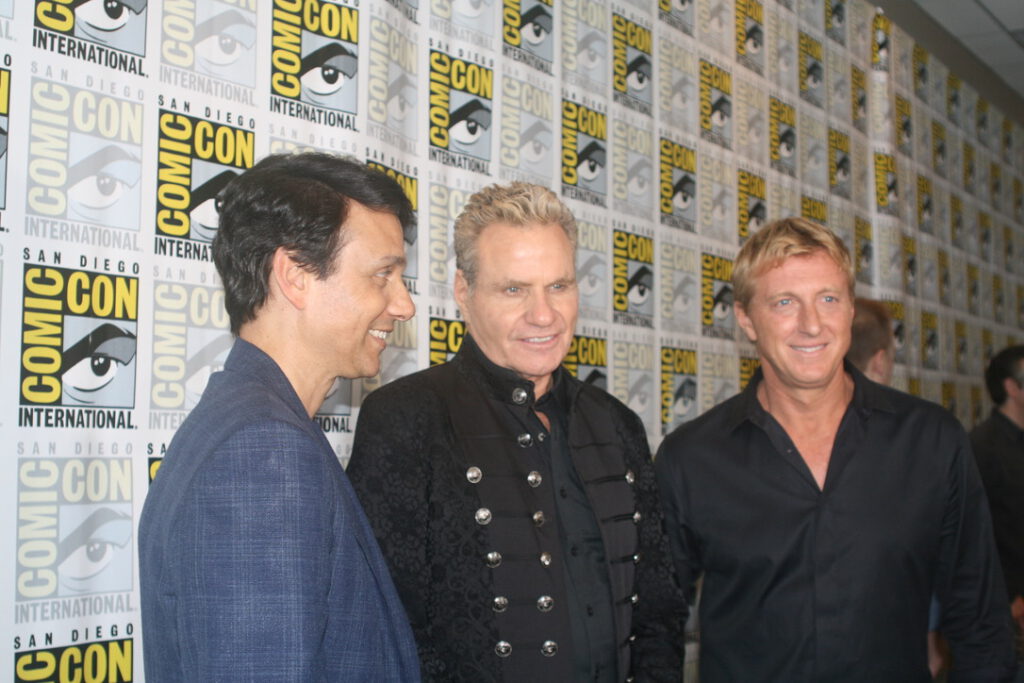It is often said that you can’t go home again, but “Cobra Kai” has been a homecoming for its stars, its characters, and its creators, bringing together the cast of “The Karate Kid” and its sequels, united by three friends who have been passionate fans of the series since they were young children. “This is very high level fan fiction,” series-co-creator and writer John Heald said at a Comic-Con press event. With Jon Hurwitz and Hayden Schlossberg, Heald had worked on raunchy R-rated comedies, but “Karate Kid” was “a series we are fans of and obsessed with.” They said that there were influences and references to the series even in their silliest comedies.
Bringing the “Karate Kid” story up to date 34 years later, “Cobra Kai” has original stars Ralph Macchio as Daniel LaRusso and William Zabka as his rival, Johnny Lawrence. Martin Kove returned in season 2 as John Kreese, who played Johnny’s coach in the original series. In the present day, Johnny and Daniel run rival dojos. While Daniel teaches the philosophy of balance he learned from his teacher and namesake of his dojo, the late Mr. Miyagi. (Pat Morita), Johnny’s students learn a more aggressive “no mercy” style of fighting.
The series, which appears on YouTube Premium, includes a cast of newcomers as the dojos’ students, and the dual generation storylines have made it popular with families. Heald, Hurwitz, and Schlossberg explained that the luxury of a television series storyline made it possible for them to give the characters more nuance. It isn’t just about good guys and bad guys anymore. Everyone is struggling in one way or another. ‘YouTube Premium is treating this like it’s their ‘House of Cards,’” Hurwitz said. “It gives us more levels to play with. We used to think of a two-hour movie as the highest form of narrative. But this gives us a much bigger landscape, even than ‘Lord of the Rings.’ TV can give you a canvas that changes the whole industry. It’s not a limiting thing.” Kove made the same point in talking about what audiences learn about Kreese that makes him more sympathetic because you know where his philosophy of fighting comes from. “My favorite part is the more vulnerable moments…That’s why the show is so good, because they’re writing gray. They’re not writing black and white anymore….I never thought of him, even in the movies, as a villain. He’s a purist…He’s not an emotional man. He’s not a sensitive man. He’s not committed to the dark side. He’s committed to winning. He lost his most valuable player because they showed mercy, and they don’t want that to happen again. In a tournament you can knock your opponent down and walk away but God forbid that happens in the street. You have to make sure he stays down.”

The third season will be another kind of homecoming, as the backstories of Mr. Miyagi and John Kreese will be explored. “We’re going to find out in this season why we are the way we are,” Kove told us. Daniel returns to Mr. Miyagi’s home in Okinawa and learns more about his sensei’s past.
The last season left us with many unanswered questions. Zabka says, “We have to see how Miguel is doing; we have to check his pulse. Johnny’s out of Cobra Kai. He gave a second chance to his mentor/father figure who took advantage of him. I always say, ‘Why would Johnny go back to the dojo after what happened?’ It was his chance to do it right and had the legs kicked out from under him. He’s a man without a home right how. He’s dojo-less.” His character will continue to try to reach out to his estranged son. Zabka says he keeps coming back to Johnny’s original line, “We have one year to make it work.” “Johnny’s always trying to make it work, to put the pieces together.” Johnny will have to deal with letting down the people he cares most about. He wants to make things right, but “I don’t think he feels that he is worthy of that. He feels like a failure.”
Macchio says “there will be a lot of stakes for all the characters in season 3. Any time you can tie into the current show pieces of ‘The Karate Kid’ universe that we all remember from the films, that’s what the writers have done beautifully. It’s nostalgia and present-day relevance, like the best meal your grandmother ever made and you get to eat it again, but with new ingredients added.” He says his character had all good intentions in season 2, “but he’s always been that ‘acts first, thinks later’ guy. So he’s going to have to deal with the repercussions of that, as we saw last season when he took the picture down and said, ‘I’m sorry.’ Or when he said in season 1, ‘I wish you were here right now.’ I love those moments.”












